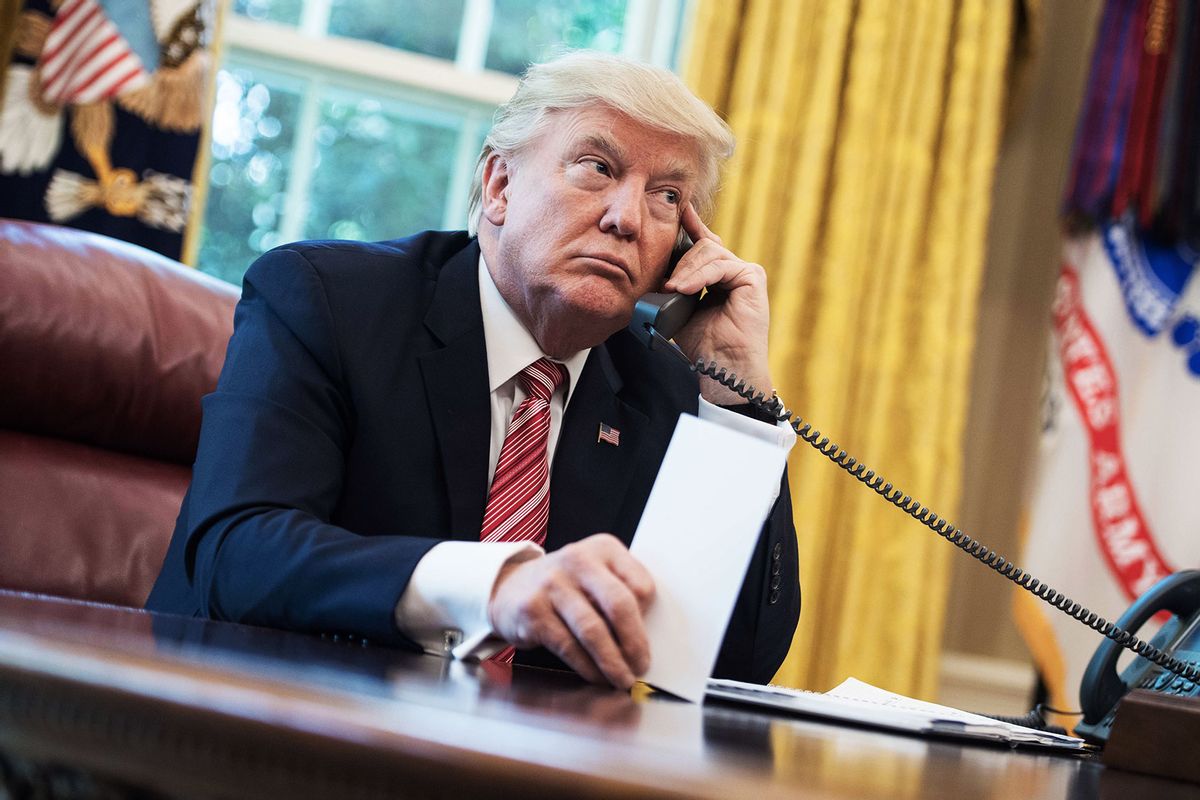After Rep. Debbie Dingell, D-Mich., said she was voting to impeach former President Donald Trump in 2019, she received a call from an unknown phone number with the person on the other end claiming to be a Washington Post reporter — but she suspects it was Trump all along, according to a new book by New York Times reporter Maggie Haberman.
"When she answered, the man on the other end identified himself as a Washington Post reporter, and said he knew her husband from his investigations in Congress. The name he gave was not one she recognized," Haberman wrote in her new book "Confidence Man," according to an excerpt published by The Washington Post. "The man asked Dingell if she was looking for an apology from Trump. No, she replied, merely that people could be civil to one another. As the man talked, Dingell couldn't shake the idea that his voice sounded like that of the forty-fifth president."
Haberman details Trump's early career and his tumultuous four years in office, revisiting his history of racism, describing his interactions with world leaders and members of Congress and unveiling the chaos that consumed his administration.
One of his ambitious ideas included bombing drug labs in Mexico after one of his leading public health officials advised that such facilities should be handled by putting "lead to target" to stop illicit substances from entering into the United States.
"He raised it several times, eventually asking a stunned Defense Secretary Mark Esper whether the United States could indeed bomb the labs," the book says, adding that Trump was confused by Assistant Secretary for Health Brett Giroir, who often wore his dress uniform. "The response from White House aides was not to try to change Trump's view, but to consider asking Giroir not to wear his uniform to the Oval Office anymore," Haberman wrote.
Then there are his erratic interactions with world leaders. The first time Trump met then-British Prime Minister Theresa May, Haberman writes, he brought up the topic of abortion saying that "some people are pro-life, some people are pro-choice. Imagine if some animals with tattoos raped your daughter and she got pregnant?" He pointed to then-Vice President Mike Pence and described him as the "tough one" on abortion.
When describing some leaders, he used profane language to express his disdain, referring to German Prime Minister Angela Merkel as "that b----," the book highlights, according to The Washington Post. He praised others for their strength, like Russia's President Vladimir Putin, and laughed when aides grew angry that Trump tweeted a proposal for a joint cyber unit with Russia that would have "effectively let the Russians into the U.S. investigations of hacking."
Want a daily wrap-up of all the news and commentary Salon has to offer? Subscribe to our morning newsletter, Crash Course.
When the coronavirus pandemic surfaced, Trump was appalled by the sight of face masks and told his aides to remove them in his presence. He even discouraged them from addressing the topic because he viewed it as a problem that negatively impacted his presidency. On the other hand, he wanted credit for vaccines, but informed aides that he could not do so because of the "radical right," referring to his own supporters.
His interactions with staffers provide insight into how he viewed people of color. When the newly inaugurated president held a reception at the White House to meet with top congressional leaders, Trump turned to a group of racially diverse staffers for Senate Democratic Leader Chuck Schumer, D-N.Y., and House Speaker Nancy Pelosi, D-Calif., and asked them to retrieve the canapes, the book highlights. In the same meeting, he told Schumer and Pelosi that the only reason he had lost the 2016 popular vote to Hillary Clinton was due to ballots cast by "illegals".
Other parts of the book demonstrate that casual racism was a part of Trump's life long before he entered the White House. During his relationship with Kara Young, a model who had a Black mother and a white father, Trump joked that she had inherited her good looks from her mother and her intelligence "from her dad, the white side," Haberman reports.
As president, he fixated on how people who represented him appeared. He complained about the way his ambassador to the United Nations Nikki Haley looked on television asking, "can't we do better lighting or give her better makeup?" according to the book.
Trump also had plans to have Jared Kushner and Ivanka Trump fired, Haberman writes. In meetings with then-White House Chief of Staff John F. Kelly and White House Counsel Don McGahn, "Trump gave instructions to essentially fire the pair. Kelly and McGahn resisted, expressing their fear that he would not back them once his daughter and son-in-law pushed back." At one point, the former president was ready to tweet that his daughter and son-in-law were leaving the White House, but was stopped by Kelly since he had not talked to them directly. He never followed up with a conversation.
Trump's inability to deal with serious matters did not stop there. When Trump lost his 2020 election, he refused to acknowledge the results and claimed widespread voter fraud.
"I'm just not going to leave," Trump told one aide, according to Haberman's book.
Read more
about Haberman's book
- "Embarrassed" Trump acknowledged loss before declaring "I'm just not going to leave": Haberman book
- "I love being with her": Trump gushes about NY Times' Maggie Haberman in new book — and it's a doozy
- NY Times' Maggie Haberman called out for withholding Trump bombshell: "Democracy dies in book deals"



Shares